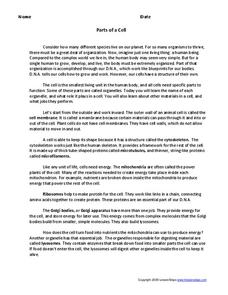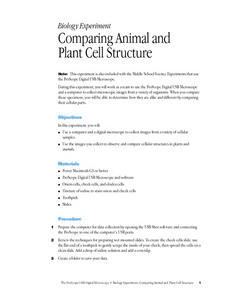Biology Junction
Cells and Their Organelles
This series of handouts and images asks young scientists to read short informational paragraphs, answer identification questions, and color and label diagrams of animal and plant cells. This is a complete resource that could be given as...
Curated OER
Living Systems Part III
Here is a fantastic, informative, interactive presentation on plant and animal cells. The PowerPoint is produced by an elementary school teacher who has a doctorate in science, and it shows! This would be a splendid presentation to use...
Baylor College
Magnifying and Observing Cells
Though it isn't a novel activity to prepare onion cell and Elodea plant cell slides as examples of cells in a microbiology unit, this resource will leave you thoroughly prepared. As pupils examine the slides that they prepare, they draw...
Curated OER
Cell Structures and Their Functions
Life science learners investigate live cells. They examine wet mount slides of cyanobacteria and Elodea plants. They peer into the dynamic microscopic world of protists. Afterward, they construct a model of a cell, including rudimentary...
Virginia Department of Education
Cell Parts
What do a bird, an egg, a rabbit, and a toad all have in common? This fun-filled resource explains the similarities and differences between cells and how all cells are similar, yet all are different. Learners begin by depicting a...
Biology Junction
Plant Cell Coloring Worksheet
In this plant worksheet, pupils define each part of the plant cell. They color and label the cell drawing and then compare and contrast plant and animal cells.
Garden Earth Naturalist Club
Parts of a Flower! Flower Dissection
Sometimes the best way to learn about plants is to see the different parts of a plant yourself. Groups of learners dissect flowers to answer questions about what they observe and what they wonder about their flower.
Curated OER
THE CELL: DESIGN AND FUNCTION
After studying the structure and functions of living cells using textbooks, internet or encyclopedias, learners prepare a PowerPoint presentation on cell structure and present it to the class.
Curated OER
Cells: A First-Hand View
In the first of two activities, your charges prepare wet mount slides of cork and bean sprout cells in imitation of Robert Hooke's historical investigation. An excerpt from his notes is included. Then, investigators compare animal cells...
Curated OER
The Microscope and Cell
For this science worksheet, learners calculate the size of different samples using the microscope as part of a formal lab assignment.
Science 4 Inquiry
Eukaryotic Cells: The Factories of Life
Eukaryotes include humans, animals, and plants. Scholars learn about the parts of eukaryotic cells. They design models of a store and match the correct function of each part to the function of a part of the cell. They review their...
Gallantsbiocorner.com
The Cell
Help young biologists piece together an understanding of cell structure with a comprehensive review worksheet. Tasking students with describing the function of the organelles found in cells and their relationship with one another, this...
Curated OER
Function of Plant Parts
In this biology learning exercise, students examine the functions of plant parts while solving the crossword puzzle. This strengthens vocabulary knowledge.
Nuffield Foundation
Observing Water Moving Through Plants
We know plants assist in the water cycle, but how do plants get water from the ground into the air? Through a series of demonstrations or labs, scholars observe the movement of water through plants. They microscopically view the cells...
LABScI
Cell Diffusion and Permeability: The See-Thru Egg Lab
Create a model to study a microscopic phenomenon. The seventh of 12 lessons uses an egg (without its shell) to represent a cell membrane. Using different solutions, learners explore the concept of cell diffusion. They monitor...
Curated OER
Benefits of Indoor Plants
Learners diagram a plant. In this Science activity, students explore the concept of photosynthesis focusing on the oxygen production. Learners calculate the amount of plants needed to filter the air in their classroom.
Curated OER
Parts of a Cell
Simplify the parts of a cell with this handout and brief activity. Learners read a two-page explanation of the parts of a cell that includes bolded vocabulary words. Using what they have just read, class members answer 19...
Curated OER
3-D Cell Model
Life science laureates choose a plant or animal cell to construct a model of as an at-home project. This handout provides guidelines, suggested materials, and a grading rubric for their reference. A full-page letter to parents is also...
LABScI
Botany: The Plant Dissection Lab
Study everything about plants! The 12-part series of lessons continues with an examination of many aspects of plants. Components of the laboratory activity address the growth and structure of plants by evaluating familiar plants. The...
Curated OER
Comparing Animal and Plant Cell Structure
High schoolers work as a team to use the ProScope Digital USB Microscope and a computer to collect microscopic images from a variety of organisms. When they compare these specimens, they are able to determine how they are alike and...
Curated OER
AP: Chapter 36: Transport in Plants
When you need a review instructional activity for your AP biologists on water and nutrient transport in plants, this one is for you! From the simple stuctures involved to the complex mechanisms that make it happen, the details of...
Curated OER
Why Are Plants Green?
Students smash plant parts and wait for visibility of chlorophyl to show why plants turn green. In this green plants lesson plan, students use acetone and filter paper for this experiment.
Curated OER
Cell Structure and Function
In this cell worksheet, students chart the function of various cell structures. Students list the organization of a multicellular organism and illustrate plant and animal cells.
Curated OER
The Cell as a System
Students review cell structures and investigate how the components of a cell operate as a system. They compare a plant and animal cell and then make a model of a cell. Students begin to understand the cell as a system by exploring a...

























